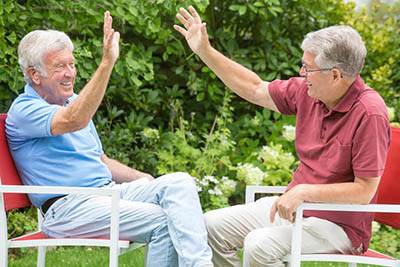How older people can reconnect after lockdown
After months of self-isolation due to the coronavirus pandemic, reconnecting with others is more important than ever, especially for older people. Here, we look at how to do it at your own pace and in ways you’re comfortable with.
The physical distancing and self-isolation measures recommended to help stop the spread of COVID-19 have left many of us feeling socially isolated and lonely. This is particularly true for older people, who were advised to stay home as much as possible in the early stages of the pandemic.
“We know that many older Australians live alone and lead quite isolated lives anyway, then they’ve been faced with taking extra precautions to stay safe due to coronavirus,” says Steve Ellen, a professor of psychiatry at the University of Melbourne.
“Given that loneliness and isolation are linked to anxiety and depression, now that we’re allowed to socialise more and reconnect with others again, it’s important to do so, particularly if you’re older and live alone.”
Craig Gear, CEO of the Older Persons Advocacy Network (OPAN), is in no doubt that being able to see loved ones again is bound to be a huge boost for many older Australians.
“Getting back to having visitors, in a COVID-safe way, is vital for both our mental and physical wellbeing. That goes for all of us, but particularly for older people.”
“Many older people I know are really pleased that they’re able to get back to going about their daily lives,” he says.
Equally – and understandably – some people may feel less confident about the world opening back up again. According to Gear, those who live in residential aged-care facilities are particularly concerned that the easing of restrictions may increase their level of risk. Ellen says this reaction is to be expected – and is completely natural.
“Older people are more likely to suffer serious illness from COVID-19, so feeling a sense of anxiety at coming out of isolation is completely normal,” he says.
“But that doesn’t necessarily mean you should put off reconnecting with others, because the long-term risks associated with loneliness are significant.”
Getting back out there
Understand the risks
Ellen says that one of the best ways to minimise coronavirus-related anxiety is by accessing good-quality health information. “Anxiety can stem from misinformation, which can be prevalent on social media, and even in mainstream media, so be selective about what you’re reading and where you’re getting your information from.”
The SIFT technique can help you filter and assess the news you consume. Staying up to date with the latest information about the easing of restrictions may also help you to feel more confident about going back out into the community.
Go at your own pace
Gear suggests taking small steps to start with. “Social support groups for older people may not be fully up and running again just yet, but finding ways that get-togethers can occur, in a safe way, will help to rebuild and maintain social connection. Something as simple as going for a walk around your local area and having a chat with your neighbours – while observing physical distancing – is a great place to start.”
Ellen agrees that it’s important for people to go at their own pace. “There’s no one size fits all with this, so think things through and decide what you’re comfortable with, and pass this onto family and friends,” advises Ellen.
“Keep in mind that many social activities can be adapted to suit, for example, you might not feel confident heading back to a cafe to catch up with a friend just yet, but you can grab a thermos and meet them in a park where there’s plenty of space and you can remain the all-important 1.5 metres apart.”
It’s OK to feel anxious
“Acknowledge that this is a time of transition and that feeling anxious is totally normal right now, and that it may take a little while to settle down,” says Ellen. “Be kind to yourself and anticipate some anxiety the first few times you go out, keeping in mind that it will get easier.” Gear also suggests seeking support during this time if you need it.
“In conjunction with a number of other consumer aged-care organisations, OPAN has worked to establish the government-funded COVID-19 support line for senior Australians at www.opan.org.au. We are here to answer all your questions, providing help, support and resources to all older Australians who are affected by Covid-19,” says Gear.
- The above article is provided for information purposes only. Discuss any concerns with a professional you feel comfortable with.
- Information supplied by Beyond Blue: https://coronavirus.beyondblue.org.au/managing-my-daily-life/coping-with-isolation-and-being-at-home/how-older-people-can-reconnect-after-lockdown.html.
- The SIFT technique:https://coronavirus.beyondblue.org.au/managing-my-daily-life/coping-with-isolation-and-being-at-home/avoid-news-overload-with-the-sift-technique.html.
- OPAN: https://opan.org.au.

